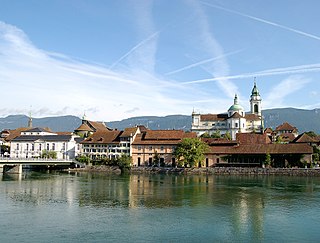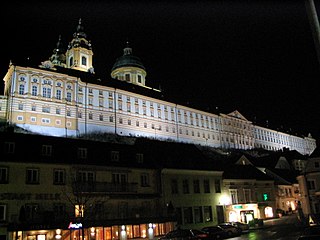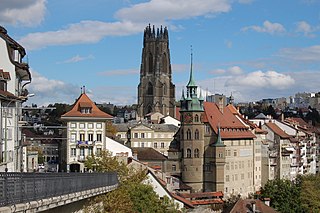
The Sonderbund War of November 1847 was a civil war in Switzerland, then still a relatively loose confederacy of cantons (states). It ensued after seven Catholic cantons formed the Sonderbund in 1845 to protect their interests against a centralization of power. The war concluded with the defeat of the Sonderbund. It resulted in the emergence of Switzerland as a federal state, concluding the period of political "restoration and regeneration" in Switzerland.
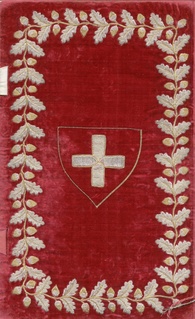
The Federal Treaty was the legal foundation for the new Swiss Confederacy of 1815. It came about after interventions by the great powers of the Sixth Coalition that defeated Napoleon.

Gallus Jacob Baumgartner was a Swiss statesman and prominent federalist.

The Old Swiss Confederacy was a loose confederation of independent small states within the Holy Roman Empire. It is the precursor of the modern state of Switzerland.

Franz Xaver Dieringer was a Catholic theologian, b. 22 August 1811, at Rangendingen (Hohenzollern-Hechingen); d. 8 September 1876, at Veringendorf.
The Cecilian Movement for church music reform began in Germany in the second half of the 1800s as a reaction to the liberalization of the Enlightenment.

Franz Hettinger was a German Catholic theologian.
Aloys Lütolf was a Swiss Catholic ecclesiastical historian.
Adolf Pfister was a German Roman Catholic priest and educator.
Christian Peter "Alphons" Maria Joseph Bellesheim was a church historian. He also reviewed and collected books.
Mauro Jöhri is a Swiss Roman Catholic friar and theologian. He was the Minister General of the Order of Friars Minor Capuchin, having served from 2006 to 2018. He is also a Professor of Theology.
Josef Anton Henne was a Swiss historian and politician active during the formative phase of the modern Swiss state.
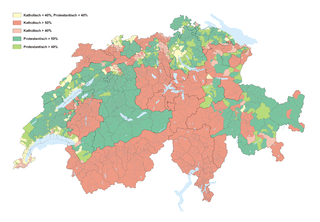
The Swiss Reformed Church is the Reformed branch of Protestantism in Switzerland started in Zürich by Huldrych Zwingli (1484–1531) and spread within a few years to Basel, Bern, St. Gallen, to cities in southern Germany and via Alsace to France.
Herbert Haag was a Swiss Roman Catholic theologian and biblical scholar of German origin.
Johannes Salat was a Swiss chronicler,dramatist and mercenary.
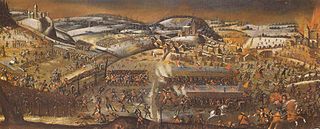
The First War of Villmergen was a Swiss religious war which lasted from 5 January until 7 March 1656, at the time of the Old Swiss Confederacy. On the one hand were the Protestant cities of Zürich and Bern, on the other the Catholic places in Central Switzerland. The Protestants tried to break the political hegemony of the Catholics, that had been in existence ever since the Second Kappel Landfrieden of 1531. The casus belli was the expulsion and execution of Protestants from the Schwyz commune of Arth. The Zürcher unsuccessfully besieged the Central Swiss-allied city of Rapperswil and thereby drove their forces together. The Bernese were defeated and repelled in the First Battle of Villmergen. The Third Landfrieden ended the conflict and restored the pre-war balance of power.
Heinrich Mertens was a German publicist, editor of the magazine The Red Book of Catholic Socialists, and mayor of Halle and Jena.
Emil Frey-Gessner was a Swiss entomologist. At first Emil Frey-Gessner studied mechanical engineering and was until 1865 technical director in the Frey-Gessner family cotton mill.Later he studied natural sciences at the Eidgenössische Technische Hochschule Zürich and became a District Teacher in Brugg then in the Canton of Aarau. From 1872 he was conservator of the entomological collections at the new museum of Geneva University. He was Dr. hc of the University of Geneva.


